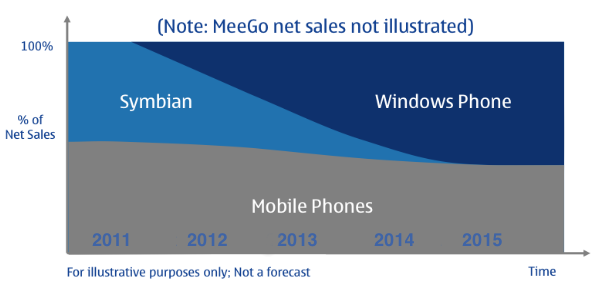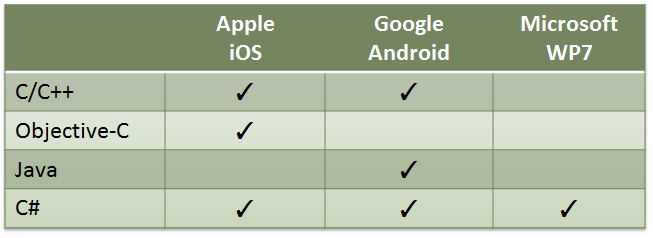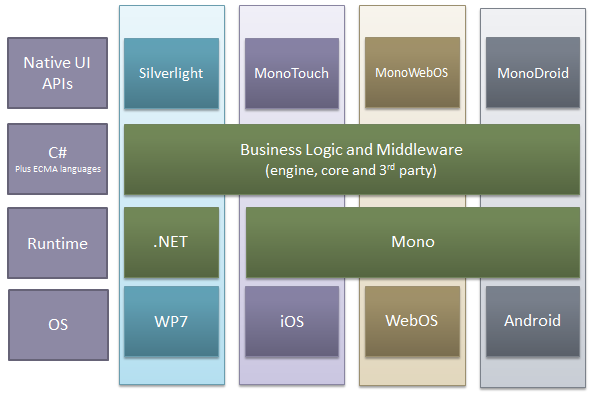Nokia Simplifies the Mobile Landscape
On Friday, Nokia announced that they were adopting WP7 as their operating system. Although some open source advocates might see this as a set-back for Linux, Android is already the best-selling Linux OS of all times. Meanwhile, as a Ben Zander student, all I see is possibility and the the world of opportunities that this opens to developers.
Although they will continue shipping Symbian for a while, they are effectively sun-setting it. Just like you can still purchase Itanium systems from HP, nobody really develops for those anymore.
Nokia had this chart to offer on Friday:

This is fascinating turn of events for C# developers as Nokia will make WP7 more relevant in the marketplace, making C# the lingua-franca of all major mobile operating systems. This astute chart explains why I am basking in joy:

C# and the ECMA CLI everywhere!
Now, certainly lots of developer houses can afford to build their software once for each platform. This is fine if your VC has a mandate to "spend that cash quickly" or if you have a surplus of interns at your disposal.
Now, if trollcats have taught us one thing is that users like the UI of their apps to be as native as possible. That is, mind-blowingly beautiful on iOS and try to match the carpet on the others.
Other snake oil vendors will tell you that you can use the same code across all platforms and still deliver an emotional experience to your users. I agree, you can deliver the same emotion of disgust when using a cross platform toolkit.
With Mono we have taken a different approach, based on our own failures from the past. We give developers access to all of the native APIs in the platform to create the best possible user experience, and exploit every single last bit of functionality available on the platform.
We advise our users to split their user interface code from the engine, or their business logic. Developers should create a native experience for their mobile apps: one per platform. For example, consider Angry Birds on iOS and Angry Birds on Blackberry. Each version adapts to provide the best user experience available on the platform.
This is a grand time to be a mobile developer. This chart illustrates the elegant balance of native experience and code sharing available to C# developers:

Update: As much as I have enjoyed responding to the comments on this blog post, the comments are now closed. I will make an exception with anyone that wants to follow up on an existing discussion. For everyone else, if you have something to share, write it on your blog.
Posted on 14 Feb 2011
Blog Search
Archive
- 2024
Apr Jun - 2020
Mar Aug Sep - 2018
Jan Feb Apr May Dec - 2016
Jan Feb Jul Sep - 2014
Jan Apr May Jul Aug Sep Oct Nov Dec - 2012
Feb Mar Apr Aug Sep Oct Nov - 2010
Jan Feb Mar Apr May Jun Jul Aug Sep Oct Nov Dec - 2008
Jan Feb Mar Apr May Jun Jul Aug Sep Oct Nov Dec - 2006
Jan Feb Mar Apr May Jun Jul Aug Sep Oct Nov Dec - 2004
Jan Feb Mar Apr May Jun Jul Aug Sep Oct Nov Dec - 2002
Jan Feb Mar Apr May Jun Jul Aug Sep Oct Dec
- 2022
Apr - 2019
Mar Apr - 2017
Jan Nov Dec - 2015
Jan Jul Aug Sep Oct Dec - 2013
Feb Mar Apr Jun Aug Oct - 2011
Jan Feb Mar Apr May Jun Jul Aug Sep Oct Nov Dec - 2009
Jan Feb Mar Apr May Jun Jul Aug Sep Oct Nov Dec - 2007
Jan Feb Mar Apr May Jun Jul Aug Sep Oct Nov Dec - 2005
Jan Feb Mar Apr May Jun Jul Aug Sep Oct Nov Dec - 2003
Jan Feb Mar Apr Jun Jul Aug Sep Oct Nov Dec - 2001
Apr May Jun Jul Aug Sep Oct Nov Dec